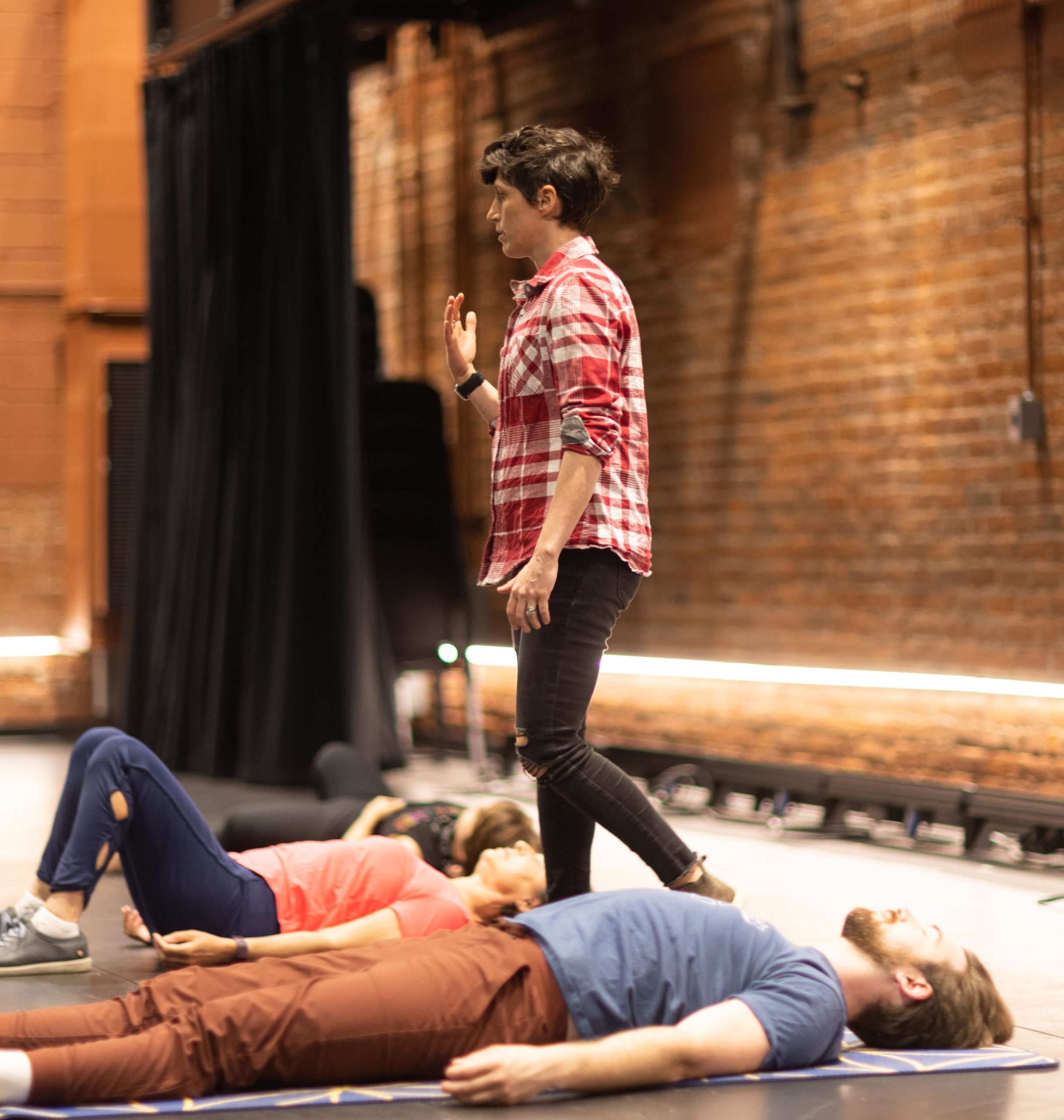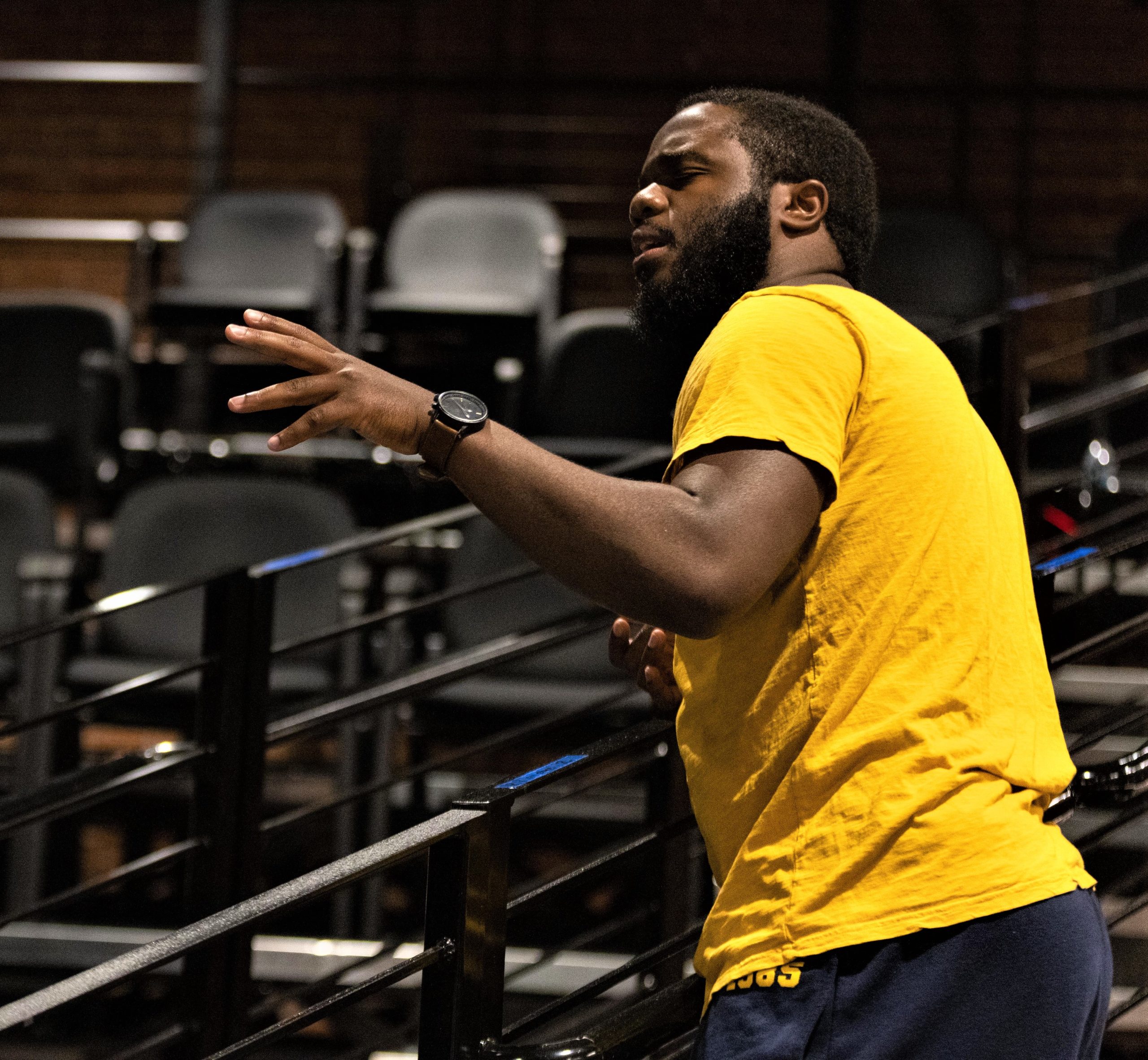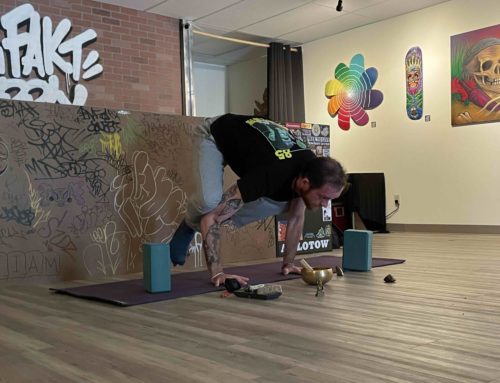WORCESTER, Mass. – Acting student Cristiano Lourenço Jr. stood tall on the practice stage of the BrickBox Theatre. He was set to play the villain Iago in William Shakespeare’s Othello. He was ready to deliver his lines.
“Pardon me my good lord,” Iago said as his voice trailed off toward the end of the line.
Lourenço is one of six Worcester residents who took part in the Hanover Theatre Repertory’s first free acting class called Worc at Play. He was among 35 people who auditioned to become actor trainees in the new program. After several weeks of Wednesday night classes, he found himself performing the role of Iago in front of a small audience for the first time.
As Iago, he directed his attention toward Othello played by fellow acting student Yahya Jingo. Lourenço raised the volume of his voice to deliver his next line. “Though I am bound to every act of duty/I am not bound to that all slaves are free.” By the end of that line, “all slaves are free” trailed off again into nothing.
This inaudible mumble was followed by a ten-second pause. Both the audience and the class instructor, Livy Scanlon, were quiet. Then suddenly, Scanlon broke the tension-filled silence. “One more time,” she softly commanded.
Scanlon is the Hanover Theatre Repertory artistic director and noted that Lourenço was dropping his volume at the end of his phrases during his line delivery.
“What you are doing is very common,” she said. “Instead of letting your volume drop at the end of your phrases, allow yourself to get louder.”
The goal for the class was to build a local pool of skilled adult actors who represent a diverse cross-section of age, gender, ethnicity, immigrant status, sexual orientation and lived experience. “Our casting can literally reflect the members of our community,” Scanlon said.
Lourenço was ready to try again. He delivered another line.
“My noble lord,” he said with minimal emphasis on the last word. Scanlon interrupted again. “There again Cristiano, try ‘my noble lord!” she said, placing an emphasis on the word lord. Undaunted, Lourenço tried again with a better result. “My noble lord!” he said with more weight to the line. Scanlon quickly interrupted once again, but this time she was pleased with the line delivery. “There you go!” Lourenço smiled and bowed his head as the audience applauded the effort.
Worc (pronounced work) at Play is a free actor training program for greater-Worcester area residents 18 years or older. It is open to all levels of acting skills including “absolute beginners.” Auditions took place in the spring. Along with Lourenço and Jingo, also making the cut were Lyndsey Hawkes, Ellen Lokos, Gideon Malugge and Michael Skrzek. Worc at Play serves as a cohort for the Hanover Theatre’s upcoming professional production of Shakespeare’s Julius Caesar.
Scanlon said there was more to the class than just rehearsing and reading lines. She put the students through several relaxation exercises to get their minds and bodies ready to act.
“There’s a lot of stereotypes about acting class,” she said. “It’s weird and loud and you lie on the ground and you roll around and some of those stereotypes are true… But, there’s a real method to why I do all those things.”

Livy Scanlon conducts acting exercises during the Worc at Play class. Photo by Unity Mike.
Scanlon says there is an organic relationship in how actors use their voices and how they use their bodies. She wants to help acting students reconnect to that organic primal form of expression. Her next exercise becomes more chaotic, but in a controlled way as Scanlon talked them into different emotional scenarios.
“Alright actors, take a little stretch, keep breathing, stay with yourself,” she commanded. The students slowly moved to their hands and knees. They arched their backs like a cat. They then moved to a squatting position. “Relax your butt. Relax your belly. Allow your body to make sound and do what you want to do.”
On Scanlon’s command, the student spontaneously ran around the stage, flailing their arms, jumping, rolling on the ground, and blurting any vowel sound that spilled out of their mouths. Some sounds were laughter, while others were primal screams. The one constant was no conscious thinking.
Scanlon counted slowly back from ten. When she finished the countdown, she commanded them to relax, but to shout many different levels of sound again from high to low. Scanlon then directed several emotional cues at the students.
“Now, you’re very, very angry,” she shouted. “Play angry!” The students followed the direction by acting angry by yelling into the distance and by screaming at each other. Then she yelled, “play joy” and they laughed; “play grief” and they cried. Then she screamed “everything is dangerous” and the student became frightened. “Play shy!” and the students cowered. Finally, Scanlon commanded, “now, without me telling you, play shy, angry, dangerous and grief.” The students followed suit expressing a hodgepodge of emotions.
“Part of why I have them move quickly and part of why I don’t have them use words, I have them use sounds instead of words, because words are very literal and intellectual,” Scanlon said following the exercise. “When you use the sounds AHHH, EEEEEE, OOOOOO, it’s much more visceral and much less intellectual.”
Scanlon also directed the students to move their bodies faster than their minds. “The self-conscious mind says ‘you look ridiculous, you look ridiculous, you look ridiculous, why are we doing this?’ So, we have to override that instinct by moving and eventually you start to retrain yourself to not always be listening to that self-conscious part of your brain on stage.”
Scanlon said in order to act, adults need to relearn how to play. She literally had her students work at playing, hence the name of the class, Worc at Play. “If you watch children, they don’t have to relearn how to play, they already know how to play,” she said. “Here’s the big difference, children know how to play and they know how to make things up, but they don’t know how to take that material and turn it into a finished product.” She said adults have the sophistication to turn imagination into a believable and complete performance. Restrictions to an actor’s inhibitions only interferes with their ability to act confidently on stage.
“One of my goals for new actors is to teach them how to generate that material and then turn on their adult part of their brain to shape it into a finished product,” Scanlon said. These exercises help acting students become present and calm within themselves. “Being watched by other human animals is very triggering to the nervous system,” she said. “So, we are literally learning how to train your nervous system.”

Gideon Malugge performs as Romeo during his Worc at Play acting class at the BrickBox Theatre. Photo by Unity Mike.
Once these exercises were complete, the students were ready, mind and body, to perform. During their Othello scene, Lourenço focused on improving his phrasing, particularly on speaking clearly. Scanlon called it the “clarity of consonants.” Jingo was focused on being loud, or owning his “theatrical sphere of expression.” He also said, to the amusement of the audience, “I’m going to remember to act.” Scanlon smiled and stood next to Jingo. “This is very common for new actors; to come up on stage and to start reciting your words,” she said. “You have to remember to act. So much to acting is remembering to do it … There’s a big difference between reciting your lines, ‘to be or not to,’ and to just act.”
Following Othello, Lyndsey Hawkes and Gideon Malugge rehearsed the balcony scene from Romeo and Juliet. Hawkes worked on improving her “authentic voice,” or the delivery of her lines in a genuine, truthful, and sincere way, while Malugge worked on his focus or connection with the audience. Finally, Michael Skrzek performed a scene from Hamlet with an emphasis on bringing a balanced performance.
The students agreed the experience of Worc at Play has been positive and rewarding.
“This has been one of the most meaningful experiences of my life,” Malugge said. “It was a great opportunity for me to learn something new.”
“The playtime aspect has been very therapeutic,” Skrzek said. “We have permission to be large and loud.”
Jingo said “it helped him tear down emotional walls. I really enjoyed coming here. Coming here has been freedom.”
Julius Caesar will be offered free and open to the public on the Worcester Common Friday, August 6 through Sunday, August 22, with preview performances starting Tuesday, August 3. As members of the ensemble cast for Julius Caesar, Hawkes and Malugge will play the third and fourth commoners, respectively; Lourenço will play a messenger; Jingo and Skrzek will be soldiers in Brutus’s army; and Ellen Lokos will play Cinna the poet.
“I’m just excited to be here,” Malugge said. “Even if I never get up there on stage. I’m just really excited to be here.”







Leave A Comment